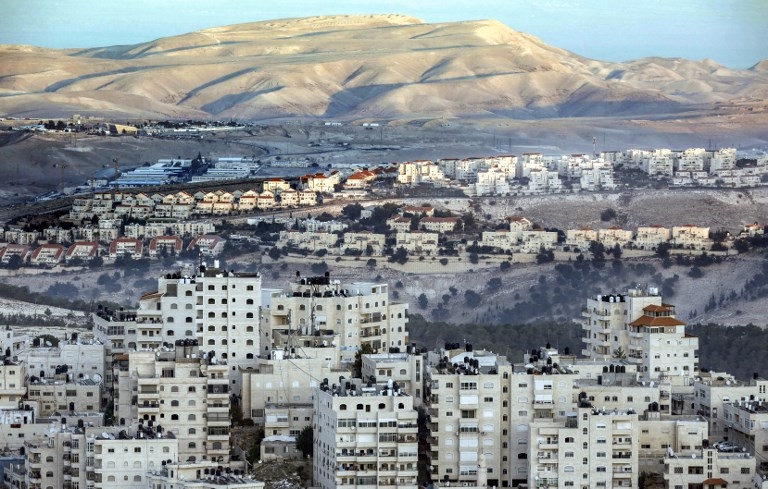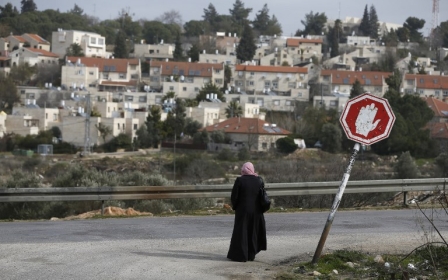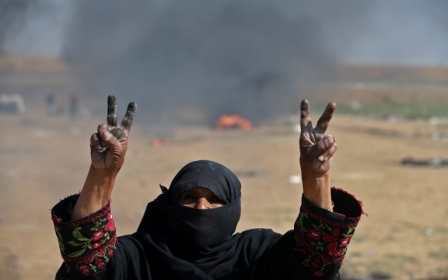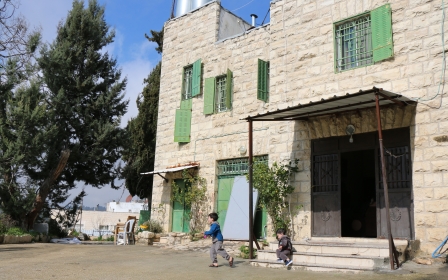Palestinians seek to join US lawsuit against Airbnb, say settlement listings are war crime

A group of Palestinians has filed a request to intervene in a lawsuit between Israeli settlers and Airbnb Inc., alleging that several Israeli settlement listings on the US-based company's website are on lands that actually belong to them.
A Palestinian-American and two Palestinian villages located in the Israeli-occupied West Bank are named in the counterclaim, filed on Monday in US Federal Court in cooperation with the US-based Center for Constitutional Rights (CCR).
In November, a group of Israeli settlers, all dual US citizens, filed a federal lawsuit in the United States accusing Airbnb of religious discrimination after the company said it would remove around 200 homes in Israeli settlements from its website.
On Monday, the Palestinian claimants accused the Israeli settlers suing Airbnb of participating in war crimes by aiding in Israel's annexation of Palestinian land.
"Their actions constitute war crimes, crimes against humanity, and discrimination on the basis of religion and national origin," they argued, according to a CCR press release announcing the Palestinian counterclaim.
Both Airbnb and the Israeli settlers will have a chance to approve or oppose the Palestinian group's request to intervene. Then the judge will rule on whether they can join the lawsuit.
If approved, the Palestinian group will become "interven0r-defendants" in the case along with Airbnb, the original defendant. They will also be designated as "counterclaim plaintiffs" against the settlers and be allowed to air additional grievances separate from the Airbnb case.
Astha Sharma Pokharel, a legal fellow at CCR, told Middle East Eye that the Palestinians behind the lawsuit are trying to bring attention to the plight of Palestinians everywhere.
"What our clients are attempting to do is shed light on this false narrative of discrimination and to bring the Palestinian experience and Palestinian voice into the picture," she said.
"The Israeli settlers who sued Airbnb have unlawfully appropriated and occupied these listings."
'Unjust enrichment'
In their lawsuit, the Palestinian claimants also accused the Israeli settlers of trespassing and "unjust enrichment" through their use of Airbnb.
In addition, another Palestinian-American, who resides in the West Bank, filed a counterclaim against the settlers for discrimination.
Citing the settler's own court filing, CCR noted that several of the settlers who sued Airbnb helped establish the Jewish-only settlements in the West Bank where the rental properties are located.
One of CCR's clients, Ziad Alwan, a Palestinian resident of Chicago, told the group that he has the document proving that one plot of land in question is registered in his father's name, even though a settler runs a bed & breakfast on the property.
"Anyone looking at the facts can tell that we are the rightful owners of this land, no matter how the settlers try to spin it," Alwan said in the CCR statement.
"I am filing this lawsuit in my father's memory, and for my own children, whom I've taught to never forget that this land is rightfully theirs," he continued.
CCR Staff Attorney Diala Shamas also accused the settlers who filed the original lawsuit of "cynically using the language of discrimination in order to further their own unlawful ends".
"Our clients' experiences - Palestinians who are directly affected by these settlers' actions - show where the real discrimination and illegality lies. This case puts the settlers on trial in a US court," Shamas said.
CCR lawyers argue that not only has Airbnb not discriminated against the settlers involved in the lawsuit, but that had Airbnb not de-listed the rentals, "the company would be contributing to international law violations".
Airbnb listings still up
Airbnb announced it would remove the 200 occupied West Bank listings in November, but Middle East Eye confirmed that those listings are, at the time of publication on Monday, still listed on the company's website.
While Airbnb's decision was welcomed by Palestinians and their supporters, it was immediately denounced by defenders of Israel.
Earlier this year, Gilad Erdan, Israel's minister of public security and strategic affairs, said the move would be viewed as an act of support for the Boycott, Divestment and Sanctions (BDS) movement for Palestinian rights.
At the time, Erdan warned that supporting BDS "now comes with a price" - and encouraged Israeli settlers impacted by the decision to file lawsuits against the company.
But human rights groups encouraged other companies of following Airbnb's lead, welcoming the decision to de-list the settlement properties.
For years, Palestinian activists and their supporters have urged Airbnb and other companies to stop doing business in illegal Israeli settlements in the occupied Palestinian territories.
On 30 January, Amnesty International called on Airbnb, Booking.com, Expedia and TripAdvisor to stop profiting off "war crimes" by removing home- and hotel-rental listings in Israeli settlements from their websites.
"In doing business with settlements, all four companies are contributing to, and profiting from, the maintenance, development and expansion of illegal settlements, which amount to war crimes under international criminal law," Amnesty said in its Destination: Occupation report.
About three million Palestinians currently live in the occupied West Bank and East Jerusalem, while around 600,000 Israelis live there in illegal Jewish-only settlements.
Israel occupied the West Bank, East Jerusalem and the Gaza Strip during the 1967 war. It later unilaterally annexed East Jerusalem in a move never recognised by the international community.
Middle East Eye propose une couverture et une analyse indépendantes et incomparables du Moyen-Orient, de l’Afrique du Nord et d’autres régions du monde. Pour en savoir plus sur la reprise de ce contenu et les frais qui s’appliquent, veuillez remplir ce formulaire [en anglais]. Pour en savoir plus sur MEE, cliquez ici [en anglais].





